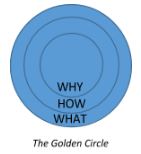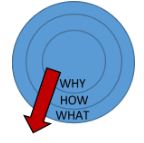This post is a continuation of our posts on a TED Talk. (part 1, part 2, part 3, part 4)
In a 2009 presentation, Simon Sinek spoke on the subject of “How great leaders inspire action.” His talk focused on characteristics of inspiring leaders and organizations and asserted “all the great and inspiring leaders and organizations in the world … they all think, act, and communicate the exact same way. And it’s the complete opposite to everyone else … I call it the Golden Circle.” 
Sinek’s “Golden Circle” describes different levels from which people think, act, and communicate. The level of “What” focuses on content, facts, details. “How” focuses on processes and methods. “Why” addresses matters of purpose, vision, mission, and goals.
Most leaders and organizations tend to work from the outside in … from what they know best to other questions that are less clear and defined. They start with what they “do” because that is what they are most familiar with and can most easily describe. Their thinking and communications focus on their “product.” They try to “sell” people on features, details, and comparative benefits. This approach is very factual, very rational, and very thorough. It is also (according to Sinek and anyone who has endured a typical sales pitch) very boring. In the end, it may persuade but it does not inspire. It may prompt a purchase but it creates little loyalty and excitement along the way. And the “buzz” of aquisition lasts only until a bigger, faster “widget” comes along.
Inspiring leaders and organizations, on the other hand, invariably work from the inside out. They start with (and obsessively communicate about) their “why.” They talk about their reasons, goals, and purposes. They focus on the significance of what they do rather than the details of what they do. They have taken the time to define their “why,” to become intimately familiar with it, and to trust it enough to communicate about and lead from it. In one memorial statement (made to illustrate this point from the life of Martin Luther King) Sinek asserted: “[King[ gave the ‘I have a Dream’ speech; not the ‘I have a Plan’ speech!”
Do you Know your Why?
There is a premise that runs through Sinek’s presentation that has profound implications for the way we practice and talk about church: “People don’t buy what you do; they buy why you do it.”
Most of us (at least those who have been part of a church for any amount of time) know our partiality for talking about what we do and expecting people to make decisions to join us on that basis. (Again, see my former article.) Our public and private dialogues about church focus stubbornly on the details, particular practices, scriptures authorizing various opinions, specifics about ministry, Sunday morning etiquette, church calendar for the week, etc.. Whether in “sales” mode (e.g., evangelism) or “retention” mode (e.g., member management), our default for discussing church tends to work from the outside of the Golden Circle to the inside. Comfortable with our “what,” we lead with that—both as a beginning point for discussions and as a theme to focus on. We keep hoping someone will “buy what we do.”
What if, instead, we determined to lead with our “Why”? What if we focused (in our personal and congregational discussions) on the reasons for what we do, the goals that motivate us, the vision and mission that drives us, and the purposes that determine the “why” of what we do?
Imagine a church that clearly understood and articulated its “why.” Imagine belonging to a church where—strolling through the foyer and stopping people at random—those you talk to know, understand, embrace, and advocate the (same) mission of the church. Imagine having a vision that can be stated in a sentence, summarized in a brochure, outlined and applied to the near future of the congregation’s life, with ministry implications worked out in depth in longer documents. Imagine a church that can specifically, uniquely, and uniformly answer the question “Why do you exist?”
Think of a church where every Sunday gathering begins (or at least includes) a statement by a leader about the driving motivations of the congregation. “Brothers and sisters, we are here to make a kingdom difference in each other, our community, and our world. We exist to reach the lost and hurting, the “least” and left behind, those who have been forgotten or dismissed—the people Jesus made a priority. Right now, we are doing that through [insert a ministry initiative here] and believe we are building a better world as a result. Do you want your life to make a difference? Do you want to belong to a group determined to change the world? Come join us in God’s grand adventure.”
Think of a church where every January is spent revisiting the mission of the church, rehearsing commitments made by the church to accomplish this mission, measuring progress that has been made towards the mission, recognizing ministries that have furthered (and repenting of ministries that have frustrated) the church’s mission, and reinforcing congregational consensus to accomplish the mission.
Imagine a church where “membership” is understood not in terms of attendance but in terms of involvement with the church’s goals. Imagine a church where every member is expected to know their giftedness and employ that giftedness on behalf of the church’s “why.” Imagine a church where potential members, who weren’t all that excited about the mission and not that committed to accomplishing the mission, were told of other church options in the area and encouraged to find another congregation to call home.
Imagine a church so permeated with a sense of calling to do the business of the kingdom and achieve God’s purposes in the world that the church is able to say “No” to merely good things so it could focus its time, energy, and resources on things that make the greatest difference.
Would you “buy” a church like that? Could a sense of “Why” be so compelling you’d be inspired, you’d want to join, you’d be willing to work and sacrifice and and bleed to see the “Why” accomplished?
All of us are seeking significance. All of us want our lives to matter. Too many of our congregations give us something to do on Sunday mornings. Great congregations offer us a way to invest our lives in the eternal.

Leave a Reply